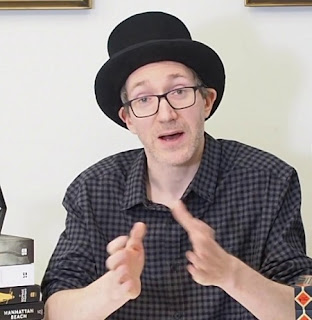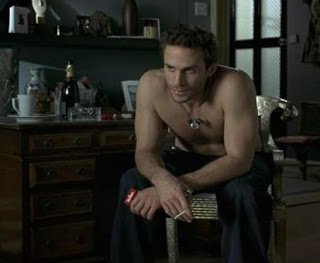When I was an undergraduate at Augustana College (1978-1982), there was a metal book rack in the foyer of the library marked "Take a book, leave a book." There wasn't usually much of a selection: well-thumbed copies of The Godfather and Love Story, romance novels, five-year old freshman composition textbooks. But I found a small red textbook of Medieval Latin and Tarzan the Invincible (one of the later Burroughs novels). One damp, cloudy Saturday afternoon during my senior year, there was nothing but an ancient, yellow-paged paperback, See Here, Private Hargrove.
Army life during World War II? Dreary! But I was heading for a 5-hour shift at the Student Union Snack Bar, which was always deserted on Saturday nights, and I needed something to read. So I exchanged it for The Dispossessed, by Ursula K. LeGuin.
I had a slight sore throat, a sort of lump that made swallowing difficult -- in the COVID era it would be inconceivable to go to work while sick, but back in the 1980s, unless you were dying, you went. The Snack Bar was a desolate square space with about ten round white tables and a gleaming counter up front. I was the only one working. We sold hamburgers, french fries, sandwiches, chips, sodas, and some desserts.
From the cash register I could see the glass wall with doors leading outside, now dark and stormy with rain; the banks of mailboxes to the left, and Adam's Bookstore to the right. From 5 to 10 pm, I had maybe ten customers. I had dinner at my post -- a hamburger, french fries, and a carton of milk.
But mostly I read See Here, Private Hargrove. It was a collection of humorous anecdotes, originally published in the Charlotte, North Carolina News, about Marion Hargrove's life as a private at Fort Bragg in 1940 and 1941: "The Boy Across the Table...", "A Soldier Stuck His Hand....", "I Grinned Weakly...": chores, drills, bellowing sergeants, trips into town to go to movies. The sort of thing that was popular during the Vietnam War: No Time for Sergeants, Gomer Pyle, Hogan's Heroes (not quite the same, but close enough).
I've done some research since. The novel was made into a movie in 1944, starring Robert Walker (1918-1951). best known for the gay-subtext Hitchcock thriller Strangers on a Train (1951). He was married twice and had four children, so I doubt that he was gay in real life.
I haven't seen the movie, but according to IMDB, Private Hargrove gets a girlfriend (played by Donna Reed, future 1950s housewife on The Donna Reed Show) and a best buddy (played by gay actor Keenan Wynn). So there may be some buddy-bonding.
Robert Walker's son, Robert Walker, Jr (1940-2019)., played the boy raised by aliens, Charlie X, on a 1966 episode of Star Trek. He had three wives and seven children. Probably not gay.
Marion Hargrove (1919-2003) went on to write two more novels, plus magazine articles and television scripts. His credits include I Spy, The Name of the Game, and The Waltons. His humorous account of trying to get a couch for the studio office was published in The Playboy Book of Humor and Satire (1965). He had two wives and six children, so probably not gay.
Today, I have replaced the small paperback with a hardbound copy -- just to have, not to read -- I don't want any new memories to develop. I want to see the book on its shelf and flash back to that night -- the sore throat, the hamburger and carton of milk, gazing out through the glass windows into a rainstorm, all of it. Bliss was it in that dawn to be alive, but to be young was very heaven.
















